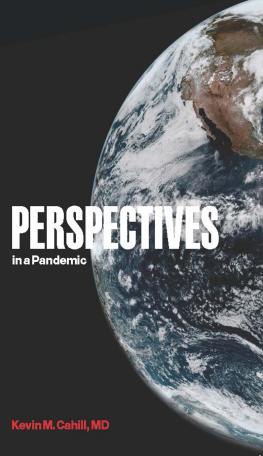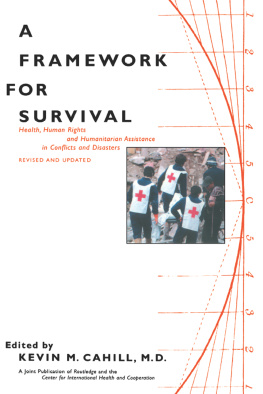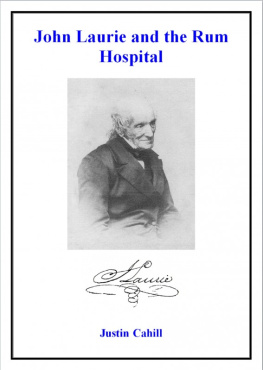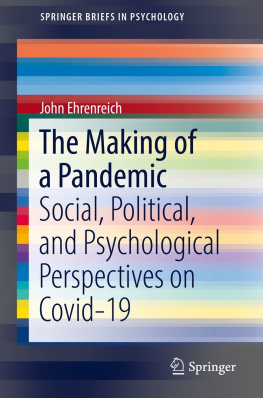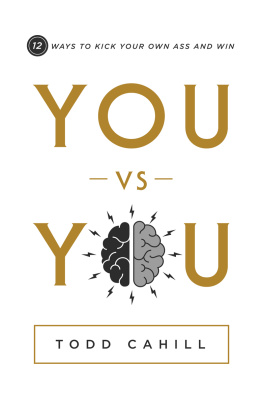PERSPECTIVES IN A PANDEMIC
PERSPECTIVES IN A PANDEMIC
Kevin M. Cahill, M.D.
Copyright2020
The Center for International Humanitarian Cooperation
Fordham University IHA Book Series
All rights reserved.
No part of this book may be reproduced or utilized in any form or by any means, electronic or mechanical, including photocopying and recording, or by any information storage and retrieval system without permission in writing from the publishers.
ISBN #13: 978-0-8232-9498-5
All royalties from this book go to the training of humanitarian workers.
Cover design: Mauro Sarri
Cover Image courtesy of NASA
The logo of the CIHC, used as a printers device to separate each section, symbolizes the unity of healing hands in relief work with the doves for peace.
Printed in the United States of America.
For the Marias Aramanda
Table of Contents
Introduction
Within a few months after a new coronavirus (COVID-19) was first detected in December 2019 in Wuhan, China, local outbreaks, usually attributed to recent travelers, were reported in many parts of the world. In the United States of America the epicenter soon became New York City. Hospitals were overwhelmed with critically ill patients, many requiring life support with ventilators and respirators. Healthcare providers, after facing shortages of protective gear, confused instructions from federal and local authorities, faulty testing materials, and no approved drug therapy or vaccine available, reverted to ancientbut effectivepublic health measures such as isolation and quarantine, a focus on facial masks, and handwashing.
My own medical facility, Lenox Hill Hospital in New York, converted to an almost fully COVID-19 institution; all elective medical and surgical procedures were cancelled and patient rooms were converted into intensive care units. Between mid-March and early June 2020, Lenox Hill Hospital admitted 1,415 COVID-19 patients, with many deaths particularly in the elderly population.
My personal physicians were pointing out that age and some underlying medical problems made my presence in the hospital dangerous, and counterproductive. Another sick or dying doctor would be an unnecessary burden on an already fragile system. Since my career in tropical medicine dealing with the complexities of international humanitarian crises, and in training medical students and relief workers had exposed me to the problems of earlier epidemics, I began a weekly letter of support to our alumni and colleagues for the critical first phase of three months. The reports were well received, and are collected in this brief book as a record of our ongoing efforts. In a pandemic, the frontline is not defined by any single hospital but rather in multiple roles, in many places, all around the world. The Dedication reflects the generosity of Marias Aramanda, mother and daughter. They helped in the editing and revising on the last six texts in the International Humanitarian Affairs Book Series, making the process a joyous one.
It is tempting to indulge in the dangerous deceit that we are experiencing unprecedented suffering during the current COVID-19 pandemic. There are many examples in the history of medicine of how society survived previous major health crises, often after great loss of life, changes in government and management, and the folly of daily desperate announcements of quick solutions to complex, seemingly intractable problems. But time and human ingenuity ultimately prevailed, and new dawns rose with eternal hope. There is an obvious difference between a global pandemic and regional epidemics, but lessons learned in the former situations can be useful in the present.
Few have been privileged to direct such relief efforts. My professional career has allowed me to work in 65 countries, mostly after natural disasters or armed conflicts, trying to provide assistance to hundreds of thousands of displaced people. I would be an obstacleat this point in my liferather than a help in a frontline hospital setting. But having taught tropical medicine to over 4,000 students, and established multi-disciplinary programs for over 3,000 humanitarian relief workers from over 140 nations, I continue to serve. Many alumni see me as their Professor, and I receive daily telephone and electronic messages from around the world seeking advice. The contributions I can make at this moment in history have been to offer reflective essays on lessons learned beginning with Somalia after the Sahel drought in the mid-1970s.
Somalia
I first went to Somalia in the early 1960s, studying the diseases of a neglected land by following nomads as they crisscrossed the barren desert and harsh brush lands seeking water and food for their camel herds. Eventually I walked the length of the country, publishing my research findings in several books and numerous scientific papers. I continued to go to Somalia for thirtyfive consecutive years, coming to know their people as few Westerners had, and they came to know me as one who was with them in troubled times.
After the Sahel Drought in 1974 drove many thousand hungry and starving displaced persons to the Somali borders, I was asked to direct the nations refugee response. Many disciplines are involved in creating a nations management of an emerging disaster. As someone with a medical and public health background I have watched colleagues presume, in press conferences and publications, that they should be in the lead, that only they have the answers. But this does not reflect reality.
Only an official government has the legitimacy to be the final arbiter, whether that be under military rule, as in Somalia at that time, or some fashion of democracy, as favored in the West. Certainly the middle of an epidemic is not the time to resolve questions of political credibility. Only a recognized government can secure international aid; donors must be cautious in imposing their philosophical beliefs as strings on assistance. Only governments can deal with the unstable tensions that come with the movements of large populations from distant lands, with different languages, cultures, clan structures, and religious beliefs. The health director must participate, but not confuse or add to confusion, by intruding publicly in debates on security, camp sites, distribution of essential shelter, food and water. Ideally this can be done under United Nations aegis, but political realities will often determine where global attention is focused. In the Somali-Sahel catastrophe there was a far greater awareness of the needs of boat people fleeing Vietnam, reflecting Americas obsession with a lost war, rather than the more extreme problems faced by other suffering populations.
My task was to establish, as rapidly as possible, camps that would serve the healthy, and try to triage the sick and dying. There were few doctors and nurses, and large numbers of patients with malaria, overt tuberculosis, cholera, dysentery, upper respiratory infection and festering wounds. New arrivals had to be screened by a cadre of volunteers, poorly trained by even the most basic standards of public health.
For a period I deployed a color coded health system where a local dresser was given a tin can with ten different colored pills. He/she gave a red pill to someone coughing up blood on the presumption it could well be tuberculosis. If it was cancer there was nothing we could offer anyway. Cholera patients usually died because we had no ability to replenish the large volume of intravenous fluid necessary to save their lives. The dead had to be buried, and, somehow, children had to be protected and provided with a semblance of school under a tree. Still, while some functions couldor shouldprogress without government assistance, an attempt to force change in the political-cultural structure of a nation in the middle of an epidemic is an arrogant, futile, and destructive activity.



